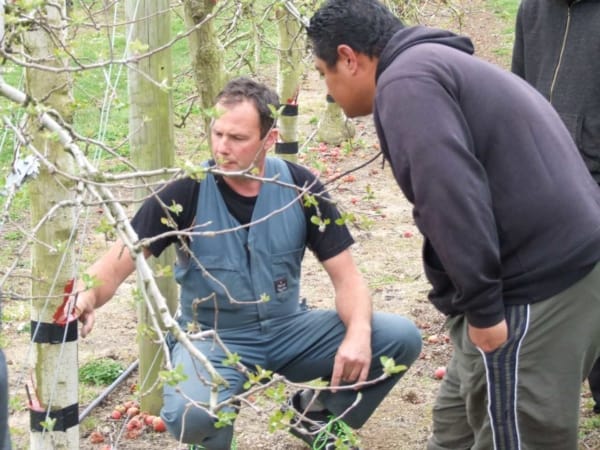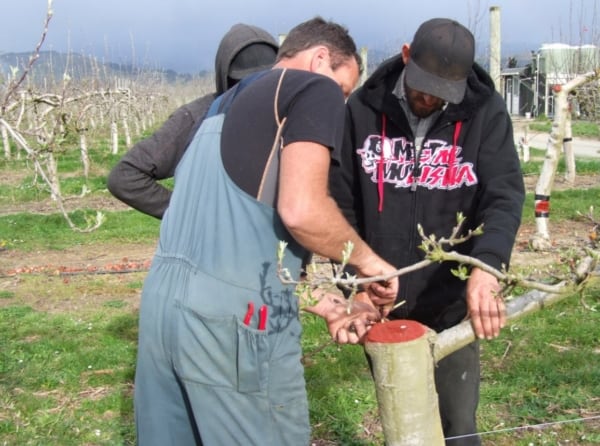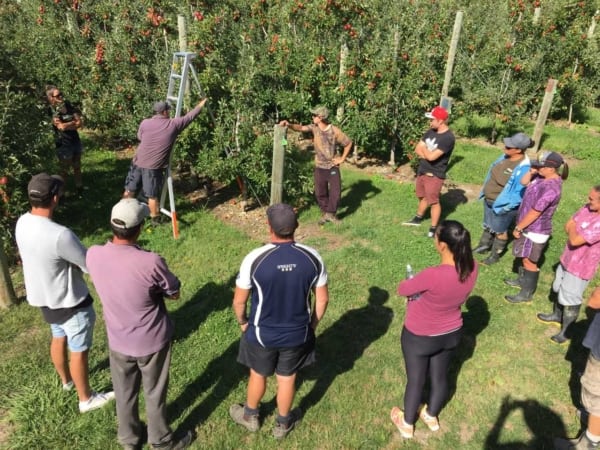Training to meet our future in Nelson/Tasman
As first seen in the “Orchardist”
Mike Nelson, Horticultural Consultant Fruition Horticulture, Nelson
As the horticultural sector goes through strong growth and is well on track to become a $10 billion industry by 2020, and with the pipfruit industry doubling in value to $1 billion by 2020 there is more and more discussion around labour, or more to the point – lack of it. Not only is there a shortage of labour on the orchard floor, which without the RSE programme would be in a sorry state, but also all the way up through the ranks where there are forecasted skills shortages. Getting staff for leading roles is proving a real challenge. Recently Mark Fry, Regional Orchard Manager for T&G Riwaka advertised two permanent positions and received no applicants at all.
Suitably trained and skilled staff are one of the pipfruit sectors biggest challenges as we move forward into the era of more intensive plantings and higher production requiring more attention to detail, higher levels of skill and knowledge. This is not only in production positions but in all areas, such as management, HR, post-harvest and logistics.
For orchard staff, the main opportunity for on the job training in Nelson/Tasman is either enrolling in the Primary Industry Training Organisation Certificate of Horticulture programme or the Lincoln University Regional Diploma programme. Both organisations contract Fruition Horticulture to provide the tuition and delivery of course work to students in the region. The majority of students are employed on pipfruit orchards with some also involved in kiwifruit. For the certificate student’s classes are generally once a month, except for March through to May where there is a break for the busy apple season, and takes 3 years to complete. Students are released from work and receive class room sessions covering theory and practical sessions with several subjects requiring field visits. For example, grafting is covered by class room theory and an explanation of the biology of the process and this is then reinforced by a field trip to an orchard where a contract grafter is working and demonstrates the ‘real world’ practical techniques to achieve a good take. Assignments are then completed by the students, both with written components and on the job assessments and for example, the grafting unit students have to provide evidence that they have completed 3 different types of grafting.
Contract grafter Rob Ketel showing Certificate in Horticulture students practical grafting techniques when reworking a block


Training keen staff is a way of developing staff and building skills and providing them with a meaningful qualification at the end of the process. Mark Fry has found that staff who have
been through the training are more confident within themselves and are more able to contribute and discuss issues that are important to the business. He believes they are more committed staff members and training on the job, getting qualifications, increases the company’s ability to promote staff from within.
A strong feature of our training is giving students an understanding of why it is important to understand the theory and how it relates to the job activity and not theory for theories sake. For example, knowing the concepts of plant hormones, processes, and photosynthesis helps them to understand why trees are pruned in a particular way and how plant responses can be modified.
Understanding the mathematics and methods of calibrating a sprayer or fertiliser spreader gives them the ability to be confident in the process and the tools to get the job done correctly and efficiently.
At the certificate level, growers have input on the range of subjects taught, with representation on a local steering committee. The subject range is designed to best meet the local requirements in fruit production as subjects can vary between regions.
Duncan Burns, training advisor for the Primary Industry Training Organisation, organises and mentors students. He visits orchards, meets with potential apprentices and arranges for them to join the training programme. He then follows up with students and employers, and monitors students’ progress.
Here in Nelson/Tasman tutoring is conducted by either myself or Greg Dryden. We cover a wide range of subjects over the 3 years ranging from weed; pest and disease identification and control, soils and fertiliser, botany, basic plant physiology, pollination and fruit load to practical tasks such as pruning, grafting, spraying and irrigation operation.
Some students having completed tertiary degrees have found the courses beneficial in learning theory and practical in tune with what is required in the industry. Richard Clarkson came to Wai-West Horticulture from a background in sports science and as a training adviser with the Police with degrees in physical education and human physiology. “I find the course really good as it gives me a better understanding about what we are doing on the orchard. It gives you the theory behind what you are doing practically on the orchard. This in turns allows me to do a better job for the employer. I am also lucky to have support from my managers to do the course. I have good conversations with them regarding what we cover in the classes and how it relates to what we are doing on the orchard at the time.” But for most students this is their first training since leaving school and completing assessments can be challenging in time and commitment but on completion of the programme are rewarded with a strong sense of achievement and accomplishment.
Students on a field trip learning about harvest techniques from Mark Grahams, Kono Horticulture

Currently there are 39 students in the Certificate of Horticulture programme. Last year saw a big increase in new students, with 26 enrolments. There are currently 6 people enrolled in the Lincoln Diploma in Horticulture class. There is a logical progression from the level 4 certificate course to the level 5 diploma course. The diploma takes 2 years to complete and cross credits are available for some subjects from the certificate course.
With the these programmes, and further options for industry training currently being developed there will be more opportunities to fill skill gaps and raise the work force capability, that the industry needs, to meet the challenging future ahead.